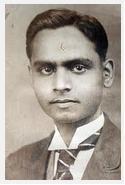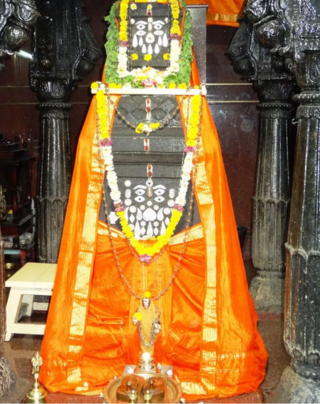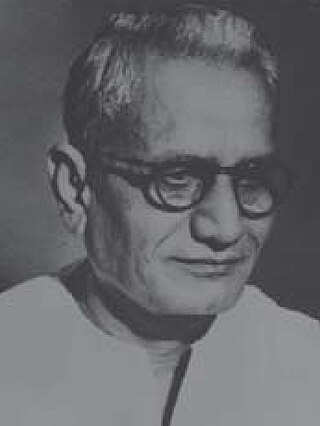
K. Satchidanandan is an Indian poet and critic, writing in Malayalam and English. A pioneer of modern poetry in Malayalam, a bilingual literary critic, playwright, editor, columnist and translator, he is the former editor of Indian Literature journal and the former secretary of Sahitya Akademi. He is also social advocate for secular anti-caste views, supporting causes like environment, human rights and free software and is a well known speaker on issues concerning contemporary Indian literature. He is the festival director of Kerala Literature Festival.

Sant Tukaram Maharaj, also known as Tuka, Tukobaraya, Tukoba, was a Hindu, Marathi Saint of Varkari sampradaya" in Dehu village, Maharashtra in the 17th century. He was a bhakt of the god Vithoba of Pandharpur. He is best known for his devotional poetry called Abhanga, which are popular in Maharashtra, many of his poems deal with social reform.
Marathi literature is the body of literature of Marathi, an Indo-Aryan language spoken mainly in the Indian state of Maharashtra and written in the Devanagari and Modi script.

Pralhad Keshav Atre, popularly known as Āchārya Atre, was a prominent Marathi writer, poet, educationist, founder–editor of Maratha, and above all a noted orator.

Vishnu Vaman Shirwadkar, popularly known by his pen name, Kusumāgraj, was a Marathi poet, playwright, novelist and short story writer, who wrote of freedom, justice and emancipation of the deprived.

Bal Sitaram Mardhekar was a Marathi writer who brought about a radical shift of sensibility in Marathi poetry. He was born in a town called Faizpur in the Khandesh region of Maharashtra.
Govind Vinayak Karandikar, better known as Vindā, was an Indian poet, writer, literary critic, and translator in the Marathi-language.

The Sahitya Akademi Award is a literary honour in India, which the Sahitya Akademi, India's National Academy of Letters, annually confers on writers of the most outstanding books of literary merit published in any of the 22 languages of the 8th Schedule to the Indian constitution as well as in English and Rajasthani language.

D. Vinayachandran was an Indian Malayalam poet. He is one of the proponents of modern style of prose in Malayalam poetry. He was born in West Kallada, Kollam district and has worked as a Malayalam professor in various colleges for more than thirty years. He had his early education in schools in and around Kallada. After completing his master's in Malayalam literature from Government Sanskrit College, Pattambi, he entered the collegiate education service as a lecture and worked in various government colleges across Kerala. He joined the faculty of Mahatma Gandhi University, Kottayam, in 1991 and retired from University's School of Letters in 2006.

Sitakant Mahapatra is an Indian poet and literary critic in Odia as well as English. He served in the Indian Administrative Service (IAS) from 1961 until he retired in 1995, and has held ex officio posts such as the Chairman of National Book Trust, New Delhi since then.
Daya Pawar or Dagdu Maruti Pawar was an Indian Marathi language author and poet known for his contributions to Dalit literature that dealt with the atrocities experienced by the dalits or untouchables under the Hindu caste system. He was a Buddhist by religion.
Vaman Pandit (1608–1695) was a Marathi scholar and poet of India. Vaman Pandit from the house of Sesha was a great poet whose poetry made quite an impact on the whole Maharashtra. Vaman Pandit's narrative poem have been very popular with masses and the Kirtankars. His main contribution lies in the fact that he has given a sound metaphysical foundation to the concept of Bhakti.

Jagannatha Dasa (1728–1809), a native of Manvi town in the Raichur district, Karnataka state, India, comes in the preceptorial line of Madhvacharya and is considered one of the notable Haridasa of Dvaita Vedanta of Madhva saint-poets of the Kannada language. He was a pupil of the great Sri Varadendra Tirtha.
Edappally Raghavan Pillai was an Indian poet of Malayalam literature and a close associate of Changampuzha Krishna Pillai. The pair, the front-runners of romanticism in Malayalam, was considered by many as the Shelley and Keats combination of Malayalam poetry. Kesari Balakrishna Pillai compared Pillai to the Italian poet, Giacomo Leopardi.

Atmaram Raoji Deshpande was a Marathi poet from Vidarbha region of Maharashtra, India. He wrote poems under the pen name Anil. He was born on 11 September 1901 at Murtijapur in Akola district of Central India. He was married to Kusum Jayawant in 1929; she took the name Kusumavati Deshpande and was also a Marathi writer.

Mangesh Keshav Padgaoankar was a legendary Marathi poet from Maharashtra, India.
Govind Purushottam Deshpande was a Marathi playwright and academic from Maharashtra, India.

Labhshankar Jadavji Thakar, also known by his pen names Lagharo and Vaidya Punarvasu, was a Gujarati poet, playwright and story writer from India. Educated in languages and Ayurveda, he taught at colleges before starting practice of Ayurveda. He had a modernist approach in literature and was heavily influenced by absurd theatre and the traditions of experimental literature. He chiefly wrote plays and poetry.
Yashwant Manohar is an Indian Marathi-language poet, writer, and a literary critic. He gained fame with his first poetry collection Utthangumpha (उत्थानगुंफा) published in 1977. His poetry speaks fiercely against caste oppression and advocates equality, liberty, and fraternity. The poetry of Manohar is deeply influenced by the life and works of Dr. B. R. Ambedkar. Manohar is a Buddhist.












